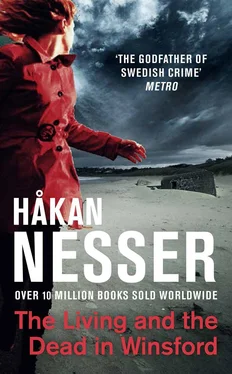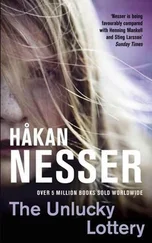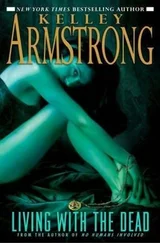Håkan Nesser - The Living and the Dead in Winsford
Здесь есть возможность читать онлайн «Håkan Nesser - The Living and the Dead in Winsford» весь текст электронной книги совершенно бесплатно (целиком полную версию без сокращений). В некоторых случаях можно слушать аудио, скачать через торрент в формате fb2 и присутствует краткое содержание. Год выпуска: 2013, Издательство: Mantle, Жанр: Криминальный детектив, на английском языке. Описание произведения, (предисловие) а так же отзывы посетителей доступны на портале библиотеки ЛибКат.
- Название:The Living and the Dead in Winsford
- Автор:
- Издательство:Mantle
- Жанр:
- Год:2013
- ISBN:нет данных
- Рейтинг книги:4 / 5. Голосов: 1
-
Избранное:Добавить в избранное
- Отзывы:
-
Ваша оценка:
- 80
- 1
- 2
- 3
- 4
- 5
The Living and the Dead in Winsford: краткое содержание, описание и аннотация
Предлагаем к чтению аннотацию, описание, краткое содержание или предисловие (зависит от того, что написал сам автор книги «The Living and the Dead in Winsford»). Если вы не нашли необходимую информацию о книге — напишите в комментариях, мы постараемся отыскать её.
The Living and the Dead in Winsford — читать онлайн бесплатно полную книгу (весь текст) целиком
Ниже представлен текст книги, разбитый по страницам. Система сохранения места последней прочитанной страницы, позволяет с удобством читать онлайн бесплатно книгу «The Living and the Dead in Winsford», без необходимости каждый раз заново искать на чём Вы остановились. Поставьте закладку, и сможете в любой момент перейти на страницу, на которой закончили чтение.
Интервал:
Закладка:
Those are the exact words that Martin wrote, and then he comments that the choice of that particular goddess is rather odd. Pheme is above all the goddess of scurrilous gossip in Greek mythology: he points out that he seems to be the only person present who reflects on that fact, and that he will take the matter up with Herold in due course. In any case, he adds, Bessie doesn’t seem to have taken the reference amiss. On the other hand, she may well not be familiar with all the details of the ancient Greek gods and goddesses. But Martin is.
The party continues until dawn. Martin writes that he eventually joins a little group discussing Cavafy, and Durrell’s Alexandria Quartet . These learned discussions seem to go on for ever — with the Russian Gusov sitting in a corner and annoying everybody with his ignorance; also present are the two lesbian artists and the French poets Legel and Fabrianny. Plus the cheerful Nietzsche specialist Bons. Martin devotes over two pages to the comments and points of view expressed in these discussions, and concludes his account of this long day and night by describing how a group of eight or ten persons trudge down to the beach and bathe naked as dawn breaks. He notes once again that it is absolutely blooming magical, but then crosses the phrase out when he realizes that it is a repetition.
He also writes — in the same unemotional style — about an outing a few days later to a place called Ormos Marathokambos, if I’ve managed to decipher the spelling correctly. A trip undertaken on four Vespas. There is a driver and a passenger on each of the scooters, and on the way back home he has the one and only Bessie Hyatt sitting behind him. By now her book has appeared, and the reception was just as overwhelming as her publishing contacts had predicted. In a week she will fly over to the USA for a PR tour. Martin writes that ‘he drives along the dusty country road towards the setting sun with the young American genius’s arms around his waist,’ and that it makes him feel ‘remarkably exhilarated’. Good God! I think: but that’s exactly what he put.
It is not clear whether Herold was also present on the outing. I decide to save the last ten pages, the rest of the notes about 1977, until the evening, load Castor into the car and set off for a different sea.
We took the attractive route via Simonsbath again, and before we got to Lynmouth we stopped at a place called Watersmeet. We clambered down some steep steps into a deep ravine dug out by the River Lyn: the village gets its name from the fact that it is at the confluence of the West Lyn and East Lyn rivers. I was feeling irritated, thanks to reading Martin’s confounded diary. I kept trying to tell myself that it was about happenings thirty-five years ago, and that it was the year before we first met: but it didn’t really work. He was twenty-four years old that first summer in Samos, and he ought not to have written like a pretentious grammar school pupil. Is this what he had sounded like when we sat together at that party in Gamla Stan? I couldn’t believe that was the case. Or perhaps we were different people at that time, both of us. If I had been able to read these notes then, what impression would I have got? Would I have fallen for them? Would I have even considered marrying him? How much did Rolf’s death and my general state of fragility mean for my decision? For my life?
Good questions, I thought as I wandered along with Castor under the green arches of the trees lining the cheerfully babbling brook. There it came again, the cheerfully babbling brook, but it didn’t give me the same degree of satisfaction on this occasion. Not by a long way. There seem to be moments when one feels in harmony with Jane Austen and the Brontë sisters, but this was not one of them. At the same time, however, there was something inside me that was rather pleased by my irritation. When had I last felt irritated? Not during the past month, in any case; perhaps not for six months. If I were to dress up the situation in a way reminiscent of that twenty-four-year-old I didn’t want to think about, I could perhaps maintain that a pile of rotten old junk had been set alight in a forgotten corner of my comatose soul — and there was good reason to feel gratitude for that: something had awoken.
Be that as it may, we walked quite a long way along the bank of one of the two rivers, and when we came to a bridge after about forty minutes we crossed over it and wandered along the opposite bank back to Watersmeet. We climbed up the steep steps to the road and the car, and drove to the little seaside town of Lynmouth.
We had a late lunch at one of the pubs down by the harbour without speaking to a single soul. We bought a few essentials in the neighbouring town of Lynton, including a pair of Wellington boots, then returned home over the moor to Darne Lodge.
A day in the life, I thought once again. I read the old diaries of my husband, who is probably dead. I go for a walk with my dog. I buy a few essentials.
Before long I shall regard cutting my nails or brushing my teeth as an event of significance.
I tried to rekindle my irritation once more — it seemed to have been blown away by the wind. As I had enjoyed it — the irritation, that is — and as it had no doubt been caused by the Samos diary from 1977, I decided to continue reading it. The rest of that first summer. Then a few chapters of Dickens, four games of patience, and then bed.
I duly did all that, and when I was about to let Castor out for his final evening walk, I noticed something lying there just outside the door. It was that dead pheasant again.
Or possibly another one, but just as dead. I dropped the glass I was holding in my hand, it shattered as it hit the stone paving, and I realized that once again I had forgotten to buy that torch.
21
The tenth of November. Cloudy with sunny intervals and a strong wind from the south-west. Eleven degrees in the morning. I took the dead pheasant with us in a plastic carrier bag when we went for our morning walk, and threw it into a clump of thorn bushes on the way to the Roman remains at the top of Winsford Hill. I tried not to think about it — the pheasant, not the Roman monument — but it was not easy. How come that it had ended up outside my door twice? I had convinced myself that it was the same bird, in fact. Some animal must have dragged it there, I thought — on the second occasion at least, at some time yesterday evening. But what animal? There are presumably foxes around here even if I haven’t seen one, but why would a fox kill a pheasant and then leave it completely untouched?
Another bird? Various birds of prey soar overhead on the moor, but even if I don’t know much about their habits it didn’t seem very likely. Birds don’t attack other birds, surely? Not in that way, at least.
A person? I dismissed the thought.
Instead, as I struggled into the powerful headwind with Castor hard on my heels, I began thinking about that face in the window. The pale young man and the gesture he had made over his throat. What had he actually meant by that? The significance in itself was obvious enough, of course — but in this case? Was it some sort of bizarre joke? Was there an intention behind it? Something serious? Who was he? Perhaps a madman who lived in that isolated house and made the same gesture to everybody he saw? Or at least, everybody who walked past his home: there were presumably not very many who did.
I also thought about the two deaths that had taken place in Darne Lodge. Two suicides with more than a hundred years between them. Irrespective of how many normal people had lived in the house since the latest act of self-destruction, it felt macabre. But on the other hand, wasn’t every aspect of my stay here macabre? Perhaps that wasn’t the right word, but something like that in any case. Something on its way out of the real world. But then, where exactly is the borderline between what we call real and what we call unreal? I had only slept in that house for eight nights by this time, and already I was beginning to experience. . well, what exactly?
Читать дальшеИнтервал:
Закладка:
Похожие книги на «The Living and the Dead in Winsford»
Представляем Вашему вниманию похожие книги на «The Living and the Dead in Winsford» списком для выбора. Мы отобрали схожую по названию и смыслу литературу в надежде предоставить читателям больше вариантов отыскать новые, интересные, ещё непрочитанные произведения.
Обсуждение, отзывы о книге «The Living and the Dead in Winsford» и просто собственные мнения читателей. Оставьте ваши комментарии, напишите, что Вы думаете о произведении, его смысле или главных героях. Укажите что конкретно понравилось, а что нет, и почему Вы так считаете.












